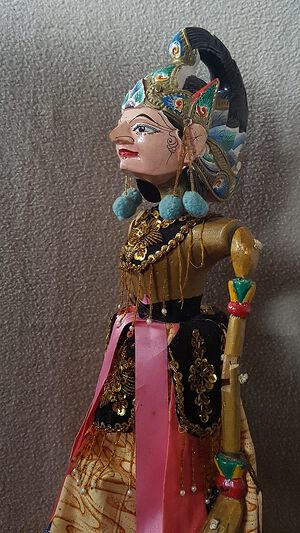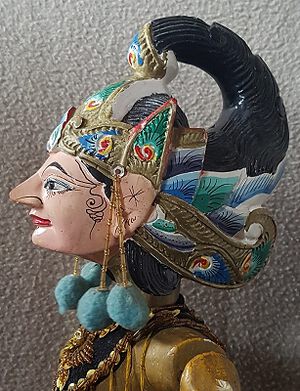Nakula
| Title | Nakula - (Raden) - Mahabharata |
|---|---|
| Other names | Pinten (young), Darmagranti, Dama, Grantika (in exile), Jayatsena, Madrisiwi, Candrageni |
| Size | 60 cm |
| Personal data | Nakula, who in Javanese farming is also known as Pinten (the name of plants whose leaves can be used as medicine) is the fourth son of Prabu Pandudewanata, king of the country of Astina with consort Dewi Madrim, daughter of Prabu Mandrapati with Dewi Tejawati, from the country of Mandaraka. Nakula was born as a twin with his younger brother, Sahadewa or Sadewa (a Javanese merchant), Nakula also had three brothers, one father, the son of Prabu Pandu and Dewi Kunti, from the country of Mandura named; Puntadewa, Bima/Werkundara and Arjuna Nakula is a drop of Batara Aswi, the God of Medicine. Nakula has two wives, namely: 1. Dewi Sayati, daughter of Prabu Kridakirata, king of Awuawlangit, and has two sons each named; Bambang Pramusinta and Goddess Pramuwati. 2. Dewi Srengganawati, daughter of Resi Badawanganala, a giant turtle who lived in the Wailu river/narmada (according to the Purwacarita, Badawanangala was known as the king of the Gisiksamodra/Ekapratala country) and had a daughter named Dewi Sritanjung. |
| Appearance | Nakula has an honest character, loyal, obedient, compassionate, knows how to repay and can keep secrets. |
| Collection | Private collection |
Nakula lives in Sawojajar knighthood, Amarta country region.
Nakula is good at riding horses and is good at using arrows and spears.
Nakula will not be able to forget about everything known because he has Aji Pranawajati given by Ditya Sapujagad, Senapati of the Mretani country.
Nakula also has a cup filled with, "Water of Life/Water of life" given by Bhatara Indra.
From the marriage with Dewi Srengganawati, Nakula received the gift of an heirloom cupu containing the water of life called Tirtamanik. After the Bharatyuda war ended, Nakula was appointed king of the Mandaraka country according to the mandate of Prabu Salya, his mother's older sister, Dewi Madrim. At the end of the story, Nakula died and died together with his four brothers. ________________________________________ RADEN NAKULA AND SADEWA These two knights were twins, the sons of Pandu from Empress Dewi Madrim, brother of Prabu Salya, king of the Madraka country. When they were children, Nakula and Sadewa were named Pintèn and Tangsèn. The twins' loyalty to their three older brothers never wavered. All five have the same stance and are a strong fortress. When the Baratayuda war almost broke out, Pendawa felt anxious about facing the powerful and patient king. At Sri Kresna's discretion, Nakula and Sadewa were sent to King Salya to calm his anger. Therefore, Prabu Salya did not have the heart to be hostile towards Pendawa considering that the five brothers were his own nephews. So when the Baratayuda war broke out, King Salya did not fight with all his enthusiasm, which resulted in the Pendawa winning the war. Nakula has twined eyes, a pointed nose, and a long Kluwih flower-trimmed bun. Stretching necklace. Ringing, popping and curling. Clothed son's butt. Nakula and Sadewa berwanda: Banjet and Bontit.
Nakula was the fourth Pandawa, son of King Pandu and Dewi Madrim. He has a twin brother named Sadewa. Nakula and Sadewa are the sons/incarnations of Dewa Aswin, namely the Twin Medicine God.
In the Mahabharata book, Nakula is a very handsome and beautiful knight. In fact, according to Draupadi, he was the most handsome husband in the world. Because of his good looks, Nakula often brags about his good looks.
Nakula has expertise in treating horses and cows. He is a very pleasant person, meticulous in carrying out his duties, and he has skill in playing sword weapons. In Javanese wayang, Nakula , also called Pinten, is good at riding a horse and playing with arrows and javelins. He will also never forget everything he knows, because he has Aji Pranawajati, a gift from Ditya Sapujagad, namely the Mretani State Senapati. Nakula has a cupu containing "banyu Pangaripan" or "water of life" given by Bathara Indra. He has an honest character, loyal, obedient, compassionate, knows how to repay benefits and can keep secrets. He lives in the Sawojajar kesatrian, Amarta State region. Nakula had two wives, namely Dewi Sayati, daughter of Prabu Kridakirata, king of Awuawulangit State, and Dewi Srengganawati daughter of Resi Badawanganala, a giant turtle who lived in the Wailu river (Badawanangala was known as the king of Gisiksamodra State alias Ekapratala). From Dewi Sayati he had two sons, namely Bambang Pramusinta and Dewi Pramuwati. And from Dewi Srengganawati, he obtained a daughter named Dewi Sritanjung, and from this marriage Nakula received the gift of an heirloom cupu which contained the water of Tirtamanik life. Nakula participated in the battle in Kurukshetra (Baratayuda. After the Bharatayuddha war, Nakula was appointed king of Mandaraka according to the mandate of Prabu Salya, his mother's sister, Dewi Madri. In the Prasthanikaparwa Book (17th book of the Astadasaparwa Mahabharata), it is told that Nakula died on the way to the peak of the Himalayas with the other Pandavas and also their wife Draupadi. But before that, Draupadi died first and was followed by Nakula's twin brother, Sadewa. When Nakula fell to the ground, Bima asked Yudistira, "My brother, our little brother is very diligent and obedient, he is also handsome and no one can match him. Why did he die here?" . Then Yudistira answered, "It is true that he is very diligent and happy to carry out our orders. However, you should know that Nakula is very proud of his good looks. Because of his attitude, he only lived up to here."
Blog: Hadisukirno – Yogyakarta - 2011 Source: History of Wayang Purwa - Hardjowirogo - PN Balai Pustaka - 1982


